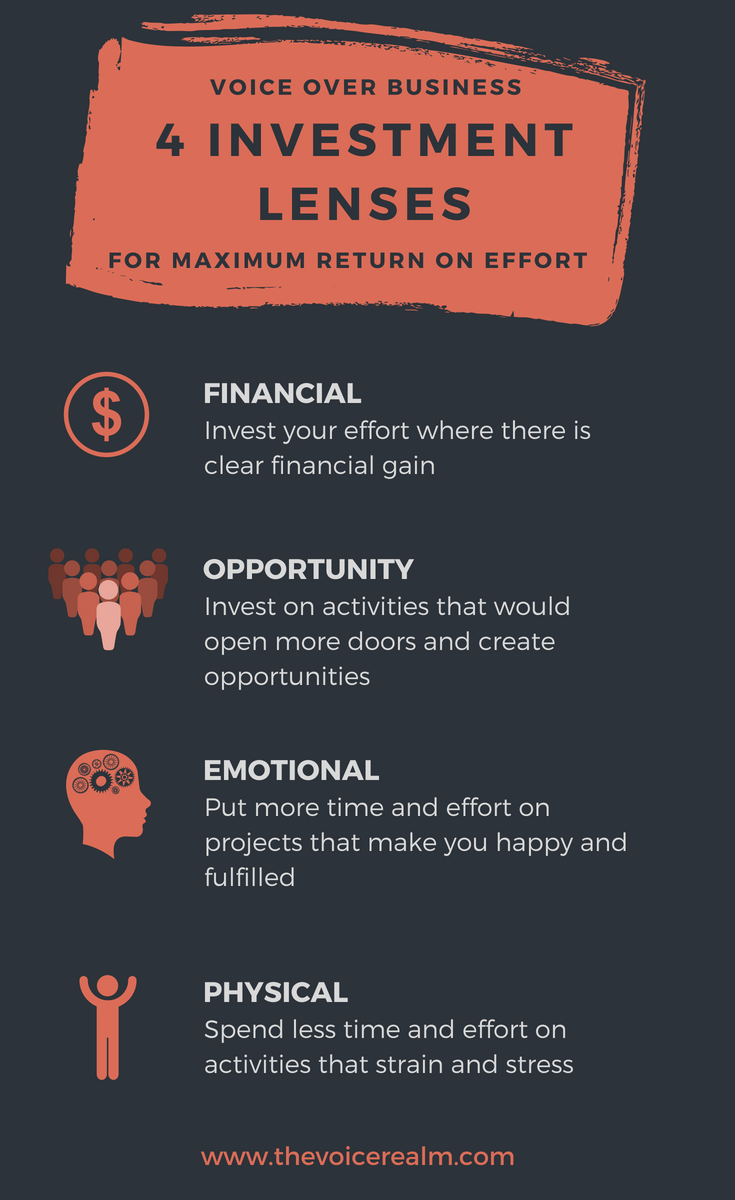Do Voice Over Actors Get Their Return on Effort?
ROI as you may know, even if you are not a business graduate, means Return on Investment. ROI measures the efficiency of your investment – what is your gain after you deduct the cost of your investment. This is not the expense that you incur to operate, but an expense for which the primary purpose is to improve the revenue of your business.
Investments can be in many forms – from acting and voice coaching classes, your marketing collaterals, conferences and seminars, and even your memberships to various voice over casting sites.
As a voice over actor, a return on investment would also mean a return on effort.
- How many hours do you spend recording for auditions – in one day, in one week, in one month?
- Out of all the auditions, how many do you book – in one day, in one week, in one month?
Any tasks or activity you do during the course of your day can be considered an investment in effort that is geared towards building your business.
To have a more accurate picture of your gains in terms of the effort and time you invest, think of it the same way as you would think of money.
How much is an hour of effort worth to you?
Let’s be conservative and not overshoot by pricing your time/effort equivalent to an hour’s worth of paid booking. (Though it would be wonderful to imagine that every 30 seconds of your time will be worth 30 seconds of an international TV spot.)
Say your effort is worth $50.00 per hour, a full 8-hour work day would be worth $400.00. When you take on a task, it is costing you $50.00/hour of your effort. For example, if you choose to spend an hour during your working hours on Instagram or Facebook, that’s costing you $13,050/year of your time and effort. Are you getting any returns from that?
When you look at your time and effort in terms of money, it is easier for you then to stop and ask yourself: Is this the best use of my time?
The Four Investment Lenses
Focus your efforts on activities or tasks where you can get the largest return on investment. Let’s look at it through four different investment lenses.
Invest your effort where there is clear financial gain
For example you are a member of two voice over casting sites.
Site 1
- Membership fee – $400.00
- 10 Auditions averaging $150.00 per project
- Percentage booked – 20%
Site 2
- Membership fee – $250.00
- 10 Auditions averaging $150.00 per project
- Percentage booked – 40%
In this example, it is clear that you should be investing more effort and time with Site #2 as you have more gains after you factor in the cost of membership and your booking percentage.
Invest in activities that would create more opportunities
As mentioned earlier, activities like acting classes and voice coaching, and attending conferences, workshops and seminars are great investments for voice talents. Classes and training can help further improve you craft and skill, which can widen your job range; conferences and seminars can help you build your network within the community and related industries – all creating and opening more opportunities for you to grow your career and business.
While classes and conferences would also mean monetary investment, there are activities that require little or no monetary investment, and still open more doors for you, like:
- Reviewing and improving your collaterals – like your demo reel and profile description
- Reviewing your past auditions and client requirements to find out why you did or didn’t get the project
- Networking and connecting with your ideal clients through social media
The other two lenses may not have a direct impact to your business’ revenue improvement, however they are still worth looking at as they are investments towards your well-being – emotional and physical.
Are you working on activities that makes you unhappy or you feel unfulfilled? These can be projects you are uncomfortable doing or you feel that it is not your niche or genre.
Do you strain your voice to complete a project? Does this client stress you out with so many revisions that it is causing you both physical and mental pain?
At first it may seem like a good idea working on these projects as they can still mean money coming in to the business, however why spend time and effort on projects that make you feel dissatisfied at the end? In the long run, the quality of your work would be effected plus the physical and or emotional strain you experience would make the money not worth the effort at all.
Measure your returns not only in terms of numbers, but also in the effort that you put into it for you to experience maximum sustainability and satisfaction in your business and career.













